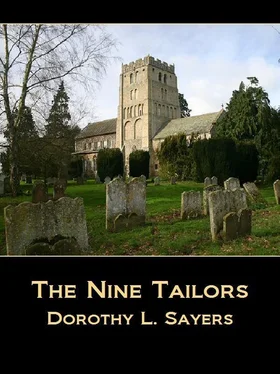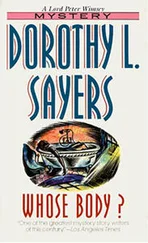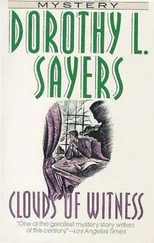Dorothy Sayers - The Nine Tailors
Здесь есть возможность читать онлайн «Dorothy Sayers - The Nine Tailors» весь текст электронной книги совершенно бесплатно (целиком полную версию без сокращений). В некоторых случаях можно слушать аудио, скачать через торрент в формате fb2 и присутствует краткое содержание. Жанр: Классический детектив, на английском языке. Описание произведения, (предисловие) а так же отзывы посетителей доступны на портале библиотеки ЛибКат.
- Название:The Nine Tailors
- Автор:
- Жанр:
- Год:неизвестен
- ISBN:нет данных
- Рейтинг книги:3 / 5. Голосов: 1
-
Избранное:Добавить в избранное
- Отзывы:
-
Ваша оценка:
- 60
- 1
- 2
- 3
- 4
- 5
The Nine Tailors: краткое содержание, описание и аннотация
Предлагаем к чтению аннотацию, описание, краткое содержание или предисловие (зависит от того, что написал сам автор книги «The Nine Tailors»). Если вы не нашли необходимую информацию о книге — напишите в комментариях, мы постараемся отыскать её.
The Nine Tailors — читать онлайн бесплатно полную книгу (весь текст) целиком
Ниже представлен текст книги, разбитый по страницам. Система сохранения места последней прочитанной страницы, позволяет с удобством читать онлайн бесплатно книгу «The Nine Tailors», без необходимости каждый раз заново искать на чём Вы остановились. Поставьте закладку, и сможете в любой момент перейти на страницу, на которой закончили чтение.
Интервал:
Закладка:
“Damn your eyes!” said his lordship, pleasantly. “You made me jump.”
“Aw!” said the bird, with a long, self-satisfied chuckle.
“Is that the bird your brother-in-law gave you? I’ve heard about him from Mrs. Tebbutt.”
“Yes, my lord, that’s him. He’s a wonderful talker, but he does swear and that’s the truth.”
“I’ve no use for a parrot that doesn’t,” said Wimsey. “Seems unnatural. Let me see — what were we—? Oh, yes, that bit of writing. You were just saying—”
“I said, of course I’d never seen it before, my lord.”
Wimsey could have sworn that she had been going to say just the opposite. She was looking at — no, not at, but through and past him, with the face of someone who sees an incredible catastrophe approaching.
“It’s queer-looking stuff, isn’t it?” she went on, in a flat voice, “don’t seem to mean anything. What made you think I should know anything about the like of that?”
“We had an idea that it might have been written by some man your late husband knew at Maidstone. Did you ever hear of anyone called Jean Legros?”
“No, my lord. That’s a French name, isn’t it? I’ve never seen a Frenchman, except a few of those Beljums that came over here in the War.”
“And you never knew anyone called Paul Taylor?”
“No, never.”
The parrot laughed heartily. “Shut up, Joey!”
“Shut up, you fool! Joey, Joey, Joey! Scratch a poll, then. Aw!”
“Oh, well,” said Wimsey. “I just wondered.”
“Where did that come from?”
“What? Oh, this? It was picked up in the church, and we had an idea it might be Cranton’s. But he says it isn’t, you know.”
“In the church? ”
As though the word were a cue, the parrot picked it up, and began muttering excitedly:
“Must go to church. Must go to church. The bells. Don’t tell Mary. Must go to church. Aw! Joey! Joey! Come on, Joey! Must go to church.”
Mrs. Thoday stepped hurriedly into the other room and flung a cloth over the cage, while Joey squawked protestingly.
“He goes on like that,” she said. “Gets on my nerves. He picked it up the night Will was so bad. They were ringing the peal, and it worried him, like, that he couldn’t be there. Will gets that angry with Joey when he starts mocking him. Shut up, now, Joey, do.”
Wimsey held out his hand for the cryptogram, which Mary surrendered — reluctantly, he thought, and as though her thoughts were elsewhere.
“Well, I mustn’t bother you any more, Mrs. Thoday. I just wanted to clear up that little point about Cranton. I expect you are right after all, and he just came down here to snoop about on his own. Well, you aren’t likely to be bothered with him again. He’s ill, and in any case, he’ll have to go back to prison to work out his time. Forgive my bargin’ along and botherin’ you about what’s best forgotten.”
But all the way back to the Rectory, he was haunted by Mary Thoday’s eyes and by the hoarse muttering voice of the parrot:
“The bells! the bells! Must go to the church! Don’t tell Mary!”
* * *
Superintendent Blundell clicked his tongue a good deal over all this.
“It’s a pity about the bottle,” he said. “Don’t suppose it would have told us anything, but you never know. Emily Holliday, eh? Of course, she’s a cousin of Mary Thoday’s. I’d forgotten that. That woman beats me — Mary, I mean. Damned if I know what to make of her, or her husband either. We’re in touch with those people at Hull, and they’re arranging to get James Thoday shipped back to England as soon as possible. We told them he might be wanted as a witness. Best way to work it — he can’t skip his orders; or, if he does, we’ll know there’s something wrong and go after him. It’s a queer business altogether. As regards that cipher, what do you say to sending it along to the Governor of Maidstone? If this fellow Legros or Taylor or whatever he is was ever in there, they may be able to spot the handwriting.”
“So they may,” said Wimsey thoughtfully. “Yes, we’ll do that. And I’m hoping that we hear from M. Rozier again soon. The French haven’t any of our inhibitions about dealing with witnesses.”
“Lucky them, my lord,” said Mr. Blundell, with fervour.
THE TENTH PART
LORD PETER IS CALLED WRONG
And he set the cherubims within the inner house: and they stretched forth the wings of the cherubims.
1 KINGS vi. 27.
And above were costly stones.
1 KINGS vii. 11.
“I hope,” said the Rector on the following Sunday morning, “there is nothing wrong with the Thodays. Neither Will nor Mary was at Early Service. I’ve never known them both miss before, except when he was ill.”
“No more they were,” said Mrs. Venables. “Perhaps Will has taken a chill again. These winds are very treacherous. Lord Peter, do have another sausage. How are you getting along with your cipher?”
“Don’t rub it in, I’m hopelessly stuck.”
“I shouldn’t worry,” said Mr. Venables. “Even if you have to lie still a whole pull now and again, you’ll soon find yourself back in the hunt.”
“I wouldn’t mind that,” said Wimsey. “It’s lying behind the whole way that gets on my nerves.”
“There’s always something that lies behind a mystery,” said the Rector, mildly enjoying his little witticism. “A solution of some kind.”
“What I say is,” observed Mrs. Venables darkly, “there are always wheels within wheels.”
“And where there’s a wheel, there’s usually a rope,” added his lordship.
“Unhappily,” said the Rector, and there was a melancholy pause.
* * *
Anxiety about the Thodays was somewhat allayed by their appearance together at Matins, but Wimsey thought he had never seen two people look so ill and unhappy. In wondering about them, he lost all consciousness of what was going on about him, sat down for the Venite, lost the Psalms for the day, embarked on a loud and solitary “For thine is the Kingdom” at the end of the second “Our Father,” and only pulled himself together when Mr. Venables came down to preach his sermon. As usual, Mr. Gotobed had failed to sweep the chancel properly, and a hideous crunching of coke proclaimed the Rector’s passage to the pulpit. The Invocation was pronounced, and Wimsey sank back with a sigh of relief into the corner of the pew, folded his arms and fixed his gaze firmly on the roof.
“Who hast exalted thine only Son with great triumph into the Heavens. Those words are from the collect for the day. What do they mean to us? What picture do we make of the glory and triumph of Heaven? Last Thursday we prayed that we also might in heart and mind thither ascend and continually dwell, and we hope that after death we shall be admitted — not only in heart and mind but in soul and body — to that blessed state where cherubim and seraphim continually sing their songs of praise. It is a beautiful description that the Bible gives us — the crystal sea and the Lord sitting between the cherubims, and the angels with their harps and crowns of gold, as the old craftsmen imagined them when they built this beautiful roof that we are so proud of — but do we, do you and I really believe—?”
It was hopeless. Wimsey’s thoughts were far away again. “He rode upon the cherubim and did fly. He sitteth between the cherubims.” He was suddenly reminded of the little architect who had come down to advise about the church roof at Duke’s Denver. “You see, your Grace, the rot has got into the timbers; there are holes behind those cherrybims you could put your hand in.” He sitteth between the cherubims. Why, of course! Fool that he was — climbing up among the bells to look for cherubims when they were here over his head, gazing down at him, their blank golden eyes blind with excess of light. The cherubim? Nave and aisle were thick with cherubim, as autumn leaves in Vallombrosa. Nave and aisle—“the isles may be glad thereof”—and then the third text—“as the rivers in the south.” Between the cherubims in the south aisle — what could be clearer than that? In his excitement he nearly shot out of his seat. It only remained to discover which particular pair of cherubims was concerned, and that ought not to be very difficult. The emeralds themselves would be gone, of course, but if one could find even the empty hiding-place, that would prove that the cryptogram was connected with the necklace and that all the queer tragedy brooding over Fenchurch St. Paul was in some way connected with the emeralds too. Then, if the handwriting of the cryptogram could be traced back to Maidstone Gaol and to Jean Legros, they would know who Legros was, and with luck they would also link him up with Cranton. After that, if Cranton could escape from the murder charge, he would be a lucky man.
Читать дальшеИнтервал:
Закладка:
Похожие книги на «The Nine Tailors»
Представляем Вашему вниманию похожие книги на «The Nine Tailors» списком для выбора. Мы отобрали схожую по названию и смыслу литературу в надежде предоставить читателям больше вариантов отыскать новые, интересные, ещё непрочитанные произведения.
Обсуждение, отзывы о книге «The Nine Tailors» и просто собственные мнения читателей. Оставьте ваши комментарии, напишите, что Вы думаете о произведении, его смысле или главных героях. Укажите что конкретно понравилось, а что нет, и почему Вы так считаете.












